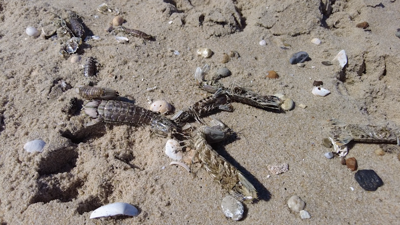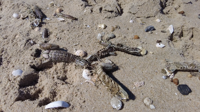DEWEY BEACH, Del. -- Beachgoers have recently noticed and taken interest in an unusual population of crustaceans on Dewey Beach. The small creatures washed ashore after the remnants of Hurricane Ian tore through Delaware's coast.
Though they have been compared to shrimp and lobsters, the creature is neither. It's a local species of stomatopod, or Mantis Shrimp, found around the western Atlantic Ocean, Chesapeake Bay, and other waterways.
"These invertebrates live in burrows in mud and in sand, and so people rarely encounter them because they're usually underground," says Dr. Noah Bressman, a marine biologist and Professor of Physiology at Salisbury University.
Visitors who noticed the creatures ashore have taken pictures and even picked them up, not realizing how dangerous they can be. According to Bressman and other experts, this species of mantis shrimp is a spearer, which means that it uses it's claws as spears to skewer fish and sometimes human admirers.
"People have been stabbed in the hand, they've had fingers broken based on these invertebrates," Bressman says. "They're really, really strong and really powerful."
Bressman advises people to steer clear of the invertebrates and to refrain from picking them up, if found alive.
People on Dewey Beach on Friday who now know that mantis shrimp can be harmful say they will be extra careful when visiting the beach now.
"I'm definitely gonna watch my two little girls a little bit closer, and we have a dog with us, so we'll have to keep an eye on that as well," says Melissa Morrison, who was visiting Dewey Beach on Friday from out of town with her family.
However, despite their bad reputation, Bressman notes that mantis shrimp have unique characteristics such as their ability to see and perceive color better than humans.



